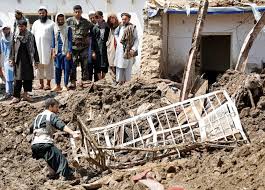
Millions of Afghans in desperate need after flash flooding crises.
Heavy off-season rainfall started on 22 July 2023 and caused flash floods in multiple provinces in Afghanistan. By 24 July 2023, the flash floods affected 18 provinces: Badakhshan, Daikundi, Ghazni ,Helmand, Kabul, Kandahar, Kapisa, Khost ,Kunar , Kunduz, Logar, Maidan Wardak, Nangarhar, Nuristan, Paktia, Parwan, Uruzgan, and Zabul. Furthermore, the areas affected by the floods have already been experiencing acute humanitarian needs due to prolonged conflicts, droughts, and financial instability. The current disaster has exacerbated the severity of the situation for these vulnerable communities.
Rising temperatures, changing weather patterns, and increased frequency of extreme events, such as floods, are compounding the struggles of these communities, disrupting livelihoods, and eroding the resilience of the local population. Regrettably, those who contribute the least to climate change are bearing the brunt of its consequences. The Aid agencies underscores the urgent need for global action to address climate change, its impact on vulnerable communities, and the inherent injustice in its unequal distribution of harm.
“Communities in Maidan Wardak and Logar provinces are grappling with the aftermath of these devastating floods, with more rainfall projected in the coming days. The situation demands immediate attention and support.
“While climate change is a global crisis, it is unequivocally evident that its impact is felt disproportionately by those who have contributed the least to its causes. We must stand in solidarity and recognize the moral imperative to support vulnerable communities as they face the consequences of a crisis they did not create.
“The HHO’s emergency response teams are working tirelessly to provide essential aid and services to those affected in Kabul and Logar, including health and medical support in the coming days.